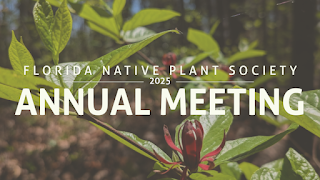2025 FNPS Annual Meeting

Saturday, July 26th 10am-12pm The Florida Native Plant Society holds a members meeting once a year. All FNPS members are invited to participate. We provide a year in review and announce grant awards, Palmetto Awards for members and vote on new officers. A link to register has been emailed to all members. Please contact us if you are a member in good standing and have not received a link ( info@fnps.org & 321-271-6702) Agenda OPENING REMARKS Introduction by President Eugene Kelly OLD BUSINESS Approve the 2024 Annual Member Meeting Minutes NEW BUSINESS Introduction of New FNPS Executive Director (Eugene Kelly) Remarks from the Executive Director (Melissa Fernandez de-Cespedes) Update on the Council of Chapters (Past-Chair: Melanie Simon) COMMITTEE REPORTS Conservation Committee (Chair: John Benton) Science Committee and Research Grants (Chair: Paul Schmalzer) Finance Committee (Chair: Ann Redmond) Landscape Committee (Chair: Natalia Manrique) Policy & Legislation Committe...


